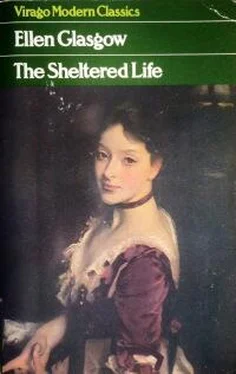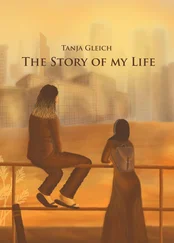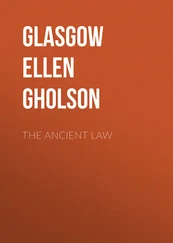Ellen Glasgow - The Sheltered Life
Здесь есть возможность читать онлайн «Ellen Glasgow - The Sheltered Life» весь текст электронной книги совершенно бесплатно (целиком полную версию без сокращений). В некоторых случаях можно слушать аудио, скачать через торрент в формате fb2 и присутствует краткое содержание. Жанр: Классическая проза, на английском языке. Описание произведения, (предисловие) а так же отзывы посетителей доступны на портале библиотеки ЛибКат.
- Название:The Sheltered Life
- Автор:
- Жанр:
- Год:неизвестен
- ISBN:нет данных
- Рейтинг книги:5 / 5. Голосов: 1
-
Избранное:Добавить в избранное
- Отзывы:
-
Ваша оценка:
- 100
- 1
- 2
- 3
- 4
- 5
The Sheltered Life: краткое содержание, описание и аннотация
Предлагаем к чтению аннотацию, описание, краткое содержание или предисловие (зависит от того, что написал сам автор книги «The Sheltered Life»). Если вы не нашли необходимую информацию о книге — напишите в комментариях, мы постараемся отыскать её.
The Sheltered Life — читать онлайн бесплатно полную книгу (весь текст) целиком
Ниже представлен текст книги, разбитый по страницам. Система сохранения места последней прочитанной страницы, позволяет с удобством читать онлайн бесплатно книгу «The Sheltered Life», без необходимости каждый раз заново искать на чём Вы остановились. Поставьте закладку, и сможете в любой момент перейти на страницу, на которой закончили чтение.
Интервал:
Закладка:
"Remember, Etta and I are on the back porch," Isabella was saying while Mrs. Archbald closed the green shutters of the French window. "The sun has come out and the air feels like summer. If you need anything, call me. The children have gone to play in the park, and I am going to make Cora lie down until lunch."
But Mrs. Archbald could not rest in peace until she knew that her father-in-law had been properly restored to himself. After leaving him for a minute, she returned with a glass of milk and a beaten biscuit, and he ate and drank to oblige her, while she watched him with a solicitude that failed now to annoy him. "You are a staff to lean on, Cora," he said, humbly grateful.
"Aren't you feeling better?"
"Yes, my dear, I'm feeling better."
"Are you sure you wouldn't like Jenny Blair to sit with you?'
"No, I can rest easier by himself. William is here, isn't he?'
"Yes, he is here." Looking up at the mention of his name, William thumped his tail and moved nearer. "If you need anything, don't get up to ring. Isabella is just outside the window."
After a last sympathetic pat, she took up the glass and plate from the table, and went out of the room with her springy step. Through the door into the dining-room and the open French window, he could catch a glimpse of the flickering sunshine in the garden. A watery green light filtered into the room, and the familiar objects appeared suddenly to be swimming beneath the waves of the sea. Outside in the trees birds were calling, and now and then he heard the lowered voices of Etta and Isabella. This was the homely texture of life, he thought presently, woven and interwoven of personalities that crossed without breaking, without bending, without losing their individual threads of existence. A good pattern, no doubt; but what of those who cannot be blended into a design? He had always been alone; he had always been different; yet he had not, except in periods of shock or strain, been unhappy. Unsatisfied, he had been, but not unhappy. Was this because unhappiness is as rare as happiness? Was the natural state of mind merely one of blunted sensation, of twilight vision? For he had had what men call a fortunate life. Only in war had he been hungry and cold. Impoverished, he had been after the war, but not actually famished, not actually shivering. His greatest sorrow had been, he supposed, what all theologians and many philosophers would describe as a moral victory. In other ways, he had prospered. He had had a just measure of those benefits for which revolutions are made, and yet he had not been satisfied. "But my life has been better than most," he murmured, thankful for the comfort of his slippers, as he sank into a doze.
An hour later he awoke with a sense of elation, of extraordinary well-being. "I've had a good nap," he thought, with his gaze on the watery green light drifting in through the slats of the shutters. "I feel rested." Part of his exhilaration may have been only freedom from pain, for the throbbing had died away in his joints; but there was something more, he told himself, than simple bodily ease. His mind, too, was eased of its burden. "Eva is over the worst," he mused; and yet there was more even than swift relief from dark apprehension. It was as if the April wind had blown through his thoughts and scattered living seeds over the bare places. Now and then in the past, especially in his youth at Stillwater, he had known this sensation in sleep, the sudden breaking off of a dream so blissful that the ecstasy had brimmed over into his life. "It is a good world," he thought drowsily, while consciousness sifted slowly in flakes of light through his mind. "I shouldn't wonder if my best years are ahead of me." Released from wanting, escaped from the tyranny of chance, he might settle down into tranquillity at the end. For age alone, he perceived, striving to grasp this certainty before it eluded him, is capable of that final peace without victory which turns a conflict of desires into an impersonal spectacle. "Yes, I shouldn't wonder," he repeated, "if my best years are ahead."
After another doze, he found himself thinking, "How attractive Jenny Blair looks in that blue dress with the white collar. Like a little girl playing that she is grown up." He saw the heart-shaped oval of her face mirrored in the greenish haze from the shutters—the rose-leaf skin, the short blunt nose powdered with freckles, the yellow-hazel eyes rimmed so strikingly in black lashes. If one asked nothing more than young innocence! Then the girl's face melted into the swimming light. He turned his head on the pillows and thought, with patience born of rest, that he must keep in touch with George for the next few days. He would go over to see him this afternoon. Perhaps Cora had asked him to drop in for lunch or dinner. Some men preferred to be alone; but George disliked solitude. Well, he would do what he had promised; he would stand by George until Eva was out of the hospital. And not only because of his promise. For he was fond of George in his heart, though he perceived as plainly as the sternest moralist could have done that George was deficient in character, in the kind of endurance that Cora so aptly called staying power. In place of character, he harboured a collection of generous instincts. A proof of weakness, no doubt; yet nothing in General Archbald's experience had astonished him more than the height that human nature sometimes attains without a solid foundation. A character like granite, he had observed, may prove as unprofitable to virtue as a succession of fine impulses. For it was true that character became warped quite as frequently as impulses ran wild.
Yes, it was possible, he found, to admire George's quality while one disapproved of his conduct. A little later, after lunch perhaps, he would go over for a word with him. A little later, but not now while the birds sang in the trees and the scent of lilacs floated in from the garden. A vague shadow crossed the shutters of the French window, and the still air of the room was stirred by ripples as noiseless as the reflection of leaves in a pond. There was a breathless laugh, broken off on a pulsing note, like the call of a bird. Jenny Blair, that was her laugh. Had he ever laughed so musically, even when he was young, even before he knew what life is? What life is at best, with its ceaseless toil, its frustrated desires, and its meagre rewards.
When he called that afternoon, George had gone to the hospital, and only John Welch was at home.
"I'm on my way to see her now," the young man said, turning from the hall into the library, which opened on a porch at the back of the house. "Of course she doesn't need me. She has Bridges and Adams; but I feel better if I am within call."
"Then don't let me keep you. She has stood it well, hasn't she?"
"Yes, she has stood it well, though she is too sick now from the ether to feel anything else. If you don't mind missing George, I'd like to talk to you. There is no hurry."
"No, I don't mind missing George. That is the least of my regrets. But I cannot keep on my legs." He sat down in the Windsor chair by the desk, and stared with a fixed frown through the door of the porch. The back yard, which had once been a flower garden, was running wild with unmown grasses and weeds, and several old lilac bushes were in bloom by the steps. It was a pity the garden had been allowed to go to seed; but the Birdsongs were in straitened circumstances as usual, and they had not been able to afford a gardener since the death of Uncle Abednego. Few old gardens were left in Queenborough nowadays; yet he remembered the time when every well-to-do house in Washington Street was enclosed in borders of roses or evergreens.
The house, too, looked shabby, he observed, withdrawing his gaze. Only persons who never read would call the room in which they were sitting a library. True, a few broken sets of books filled the lower shelves of the rosewood bookcases; but odd pieces of china, mostly of the Willow pattern, were arranged behind the glass doors at the top. Newspapers or light magazines littered the fine Sheraton table in the centre of the room and George's big mahogany desk by the back window. There were curtains of wine-coloured damask, faded by age and use into silvery purple, and a grey-green Axminster carpet with rubbed places. In one corner, between the desk and the door, a small cupboard was open, and he could see George's leather coat and golf-clubs, and, on a rack above, the guns and bags that were used in the shooting season. George was a famous shot. Every year he spent a part of November shooting ducks at a place on James River, and nothing else in life was important enough to interfere with this annual engagement. Since his game-bag was as open as his mind or heart, Mrs. Archbald often remarked that her butcher's bill was pared down to the bone every autumn.
Читать дальшеИнтервал:
Закладка:
Похожие книги на «The Sheltered Life»
Представляем Вашему вниманию похожие книги на «The Sheltered Life» списком для выбора. Мы отобрали схожую по названию и смыслу литературу в надежде предоставить читателям больше вариантов отыскать новые, интересные, ещё непрочитанные произведения.
Обсуждение, отзывы о книге «The Sheltered Life» и просто собственные мнения читателей. Оставьте ваши комментарии, напишите, что Вы думаете о произведении, его смысле или главных героях. Укажите что конкретно понравилось, а что нет, и почему Вы так считаете.












